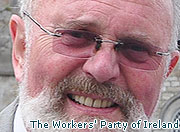An Irish senator hoping to become Ireland’s first homosexual president has suffered a setback after ‘disturbing’ comments he made about paedophilia and incest were republished.
During an interview with a current affairs magazine in 2002 Senator David Norris said “in terms of classic paedophilia, as practised by the Greeks, for example, where it is an older man introducing a younger man to adult life, there can be something said for it”, though he took pains to stress that this did not appeal to him.
However Senator Norris said that when he was younger he would have “greatly relished the prospect of an older, attractive, mature man taking me under his wing, lovingly introducing me to sexual realities”.
Abuse
The Senator also suggested that people had become hysterical about paedophilia. And he said that “in some instances” child sex abuse victims are “more damaged by the condemnation than the experience”.
But Christine Buckley, a sex abuse survivor, said: “I’m just terribly, terribly disappointed. There’s a huge naïvety I believe here and I think that’s the issue that I’d have most concerns with.
Incest
“I don’t think, for example, that David Norris would ever attempt to abuse a minor, but there’s nothing here that leads me to believe that the whole issue of abuse has actually hit the ventricles of his brain.”
During the interview, first published in Magill magazine in 2002, he did not appear to endorse any minimum age of consent saying: “The law should take into account consent rather than age”.
And when asked about incest Senator Norris concluded that there was a case for banning it but only for girls who might have a genetically undesirable pregnancy.
Shocking
However, after the interview was republished last month Senator Norris passionately refuted claims that he was in favour of incest and paedophilia.
In a statement on his website he said: “The presentation of references to sexuality in the article attributed to me were misleading in that they do not convey the context in which they were made.
“People should judge me on my record and actions as a public servant, over the last 35 years and on the causes and campaigns, for which I have fought, and not on an academic conversation with a journalist over dinner.”

